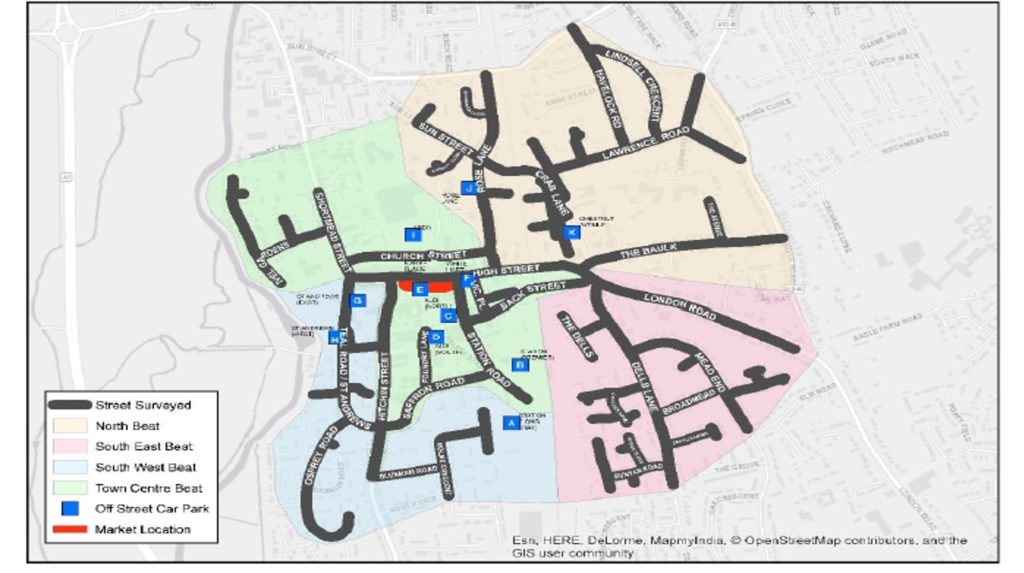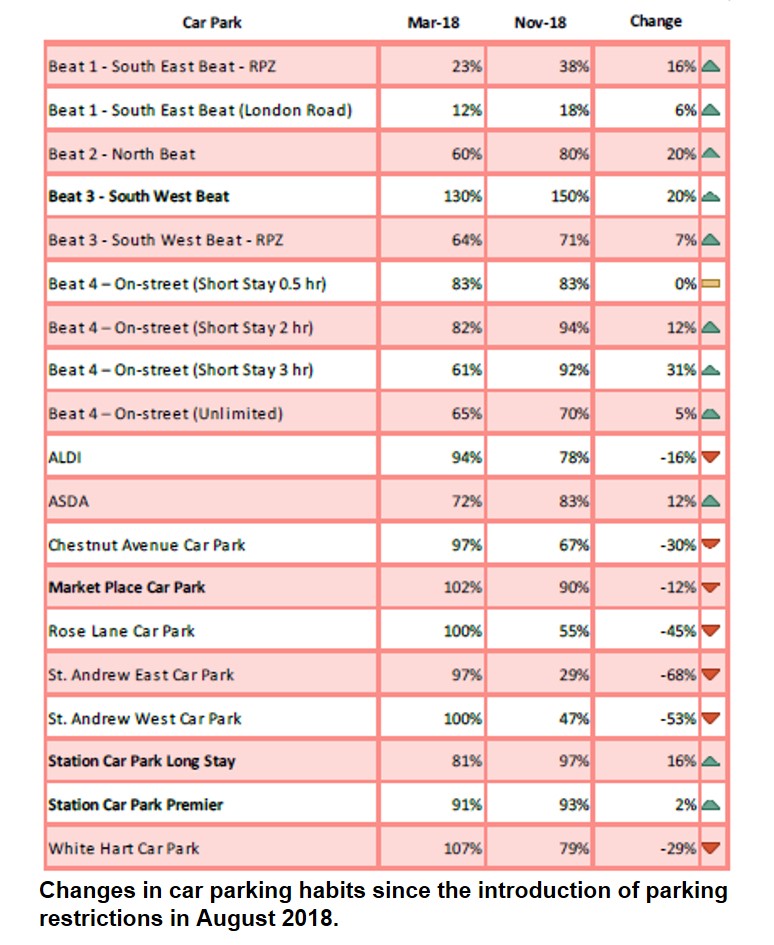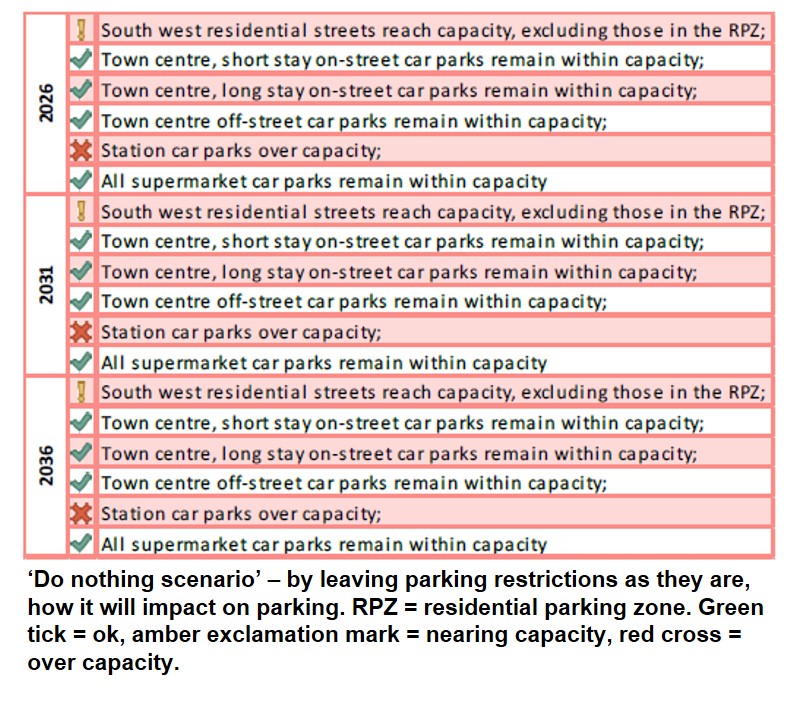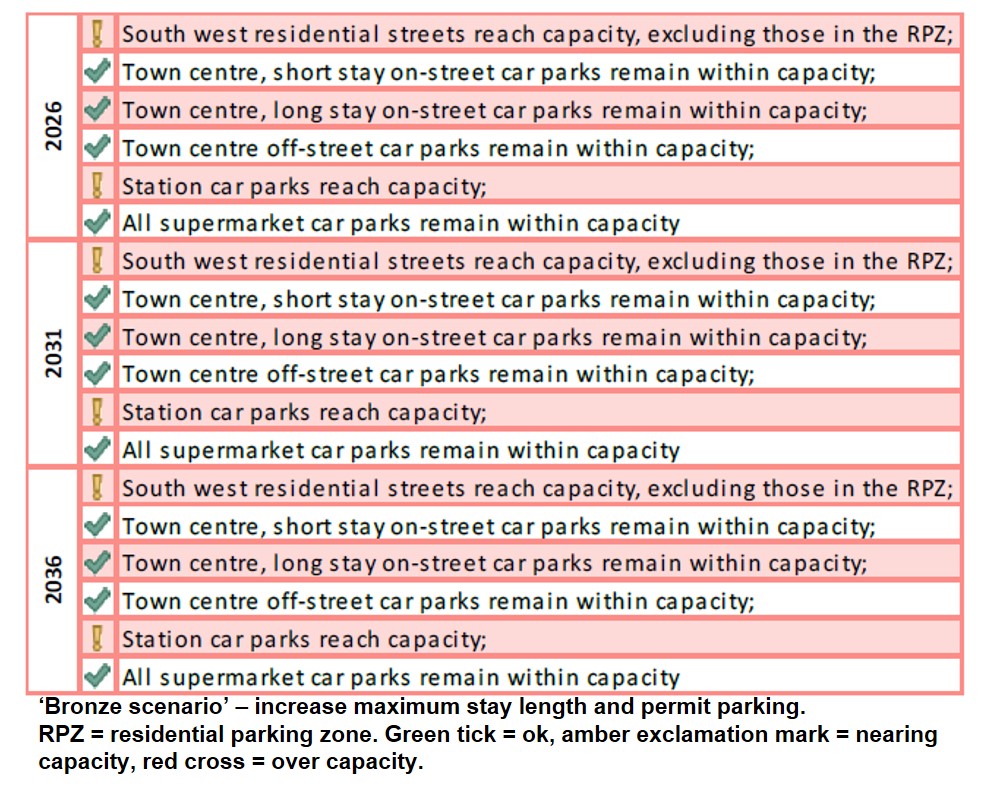Back in March 2018 CBC initiated a parking study (report number: 70042827-TN01) and came up with recommendations on how to improve the town centre parking (report number: 70042827-TN02). The recommendations report concluded that there will be a strain on parking in Biggleswade and we would require additional town centre parking capacity to meet forecast demand until 2036.
However, Biggleswade Town Council implemented changes to parking in the town centre on 1st August 2018 and it was noted by Parking Enforcement Officers that parking in Biggleswade had changed, with usage in the town centre car parks reducing substantially and an increase in on-street parking. As a result CBC commissioned a new parking report for Biggleswade that I have obtained through a freedom of information request, it has not previously been made public.
The town was surveyed on a ‘neutral’ weekday (Wednesday 21 November 2018) and it was done in a variety of ways. Where the majority of parking was expected to be long stay e.g. residential and at the train station car parks, surveys were undertaken at three times of the day (early morning, mid-morning and mid-afternoon). Town centre on-street parking sites, and for the smaller controlled off-street car parks had more frequent surveys between 08:00 and 18:00 every 30-minutes. Finally In/Out surveys were used at ASDA between 08:00 and 18:00. The town was split into ‘beats’ to assess residential parking, however these areas are clearly too small and fail to cover many of the streets I know suffer from significant parking issues (see attached map).

The changes to parking behaviour are shown in the table and there is a clear shift of parking from town centre car parks to residential parking zones and the train station car park. Interestingly, the main station car park was already at over 80% capacity back in March 2018 and was full in November 2018 following the introduction of parking restriction in the town. It would seem highly predictable that the station car park would struggle to meet demand and as a result residential parking would increase – the cars need to go somewhere!
Despite very limited ‘beats’ the report also notes that the displacement of vehicles from town centre car parks has led to an increase in the amount of employee parking on streets within the ‘northern beat’ which includes Crab Lane, Rose Lane and many other roads. Bringham Gardens, Crab Lane and Rose Lane all meet the criteria for having problem residential parking, but this was already the case in March 2018. However, other streets such as Barnett Close, Lawrence Road and The Baulk also saw a notable increase in parking but don’t quite meet criteria for problem residential parking. It would have been interesting to see how streets covering a much wider area faired from this sort of analysis.

CBC then used modelling software to assess the likely impact of the growth of the town on parking using the following projected increases in Biggleswade’s population; 2026 – 10.02%, 2031 – 13.93% and 2036 – 18.61%. It’s not clear if these projections, agreed by CBC, are accurate and include the 1500 new houses recently approved or any proposed new builds in the local plan. As the station is sold as a fast line into London it also attracts commuters from surrounding towns and villages and their growth also needs to be taken into account.
SO WHAT WERE THE RESULTS?
If CBC adopt a ‘do nothing’ approach and leave the parking situation as it is the modelling showed that the station car park will soon reach capacity as shown in the table. I recently campaigned as co-chair of the Biggleswade Rail User Group to get this car park extended by 55 spaces but it seems reasonable to assume that these will quickly be swallowed up by commuters, despite the charge of £5.40/day. Long term this issue of long stay parking, for town centre workers and commuters would remain. The residential streets of the south west would also suffer and there are already significant issues around the Holme Crescent area. While this could be dealt with by a residential parking permit approach it will simply displace cars to the adjacent streets and not address the core issue.

The alternative model was called the ‘Bronze scenario’ which looked to overcome the issues identified in the ‘do nothing’ approach without the provision of any new car parks (see table). To cater for the demand, this scenario would expand the use of workers permits introduced at Rose Lane to include St Andrew’s East, St Andrew’s West (Mill Lane) and Chestnut Avenue and increased the maximum stay length. However, it should be noted that these town centre car parks are not under the control of CBC but are operated by Biggleswade Town Council. Although the Town Council had promised to review the town centre parking in January this has been delayed so that they can assess the impact of the extra train station car park spaces. Meanwhile the town and its residents are all crying out for an extension of the free parking from 1 hour to 2, or even 3 hours, to encourage people into the town and halt the decline in footfall. The Town Council have made positive noises about doing this but there is clearly a reluctance to make incremental changes, despite the immediate benefits it might bring to the town.

THE CONCLUSIONS?
The November 2018 survey suggests that, ‘due to the additional capacity released in Biggleswade resulting from the recent change in parking regime, further capacity is not currently forecast to be required’. However, anyone in Biggleswade will tell you that those cars have not simply evaporated, they have been displaced onto residential streets. This has led to a great number of unhappy residents, workers and commuters and this situation will only worsen. In part, this is acknowledged in the report ‘it was also observed that changes in the parking regime have been associated with a shift from employees using town centre off-street parking towards the use of residential streets. As such, a future conflict may arise which requires the introduction of further Controlled Parking Zones.’
The report summarises that no new car parks are required in Biggleswade in the immediate future, and herein lies the crucial point ‘no additional parking revenue to CBC is forecast from Biggleswade’. As a result the report suggests that Biggleswade should NOT be prioritised for additional parking which I’m sure most residents will disagree with.
WHAT WILL I DO? If I am elected as your councillor for Biggleswade South I will address these issues with CBC and ask for a more detailed report with expanded survey regions that will truly measure the scale of residential parking and how it crosses over with parking around schools at key times leading to dangerous parking in many areas. I will also question the accuracy of the modelling given our fast train links to London, proximity to the A1 and the likelihood of attracting a higher than normal proportion of commuters into the town. With an accurate report I aim to get Biggleswade prioritised for parking improvements. I will clarify with CBC the requirements for residential parking schemes and get them put in place where they are most needed. I also pledge to continue to work with the Town Council to address the overall parking strategy, including the length of free parking.